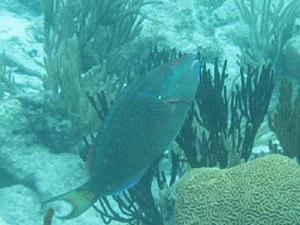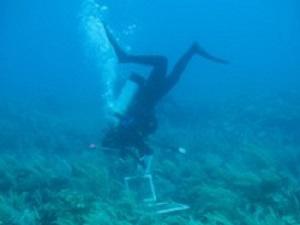Courtney E Cox
Other projects
15 Apr 2013
Genetic Structure of Stoplight Parrotfish across the Mesoamerican Barrier Reef
25 Jun 2015
Evaluating and Improving Coral Reef Conservation Strategies across the Mesoamerican Coral Reef
The project will evaluate the effectiveness of the most recent Belizean fisheriesregulations as a coral reef conservation tool by quantifying post-regulation coral and algal cover,fish population structure, and harvesting levels.

Stoplight Parrotfish.
Caribbean coral cover collapsed in the early 1980s and has been below 20% for nearly three decades (Gardner et al. 2003). A key aspect of reef degradation is the increase of macroalgae, particularly on Caribbean reefs, due largely to the over-harvesting of parrotfish, surgeonfish and other herbivorous reef fish (Bruno et al. 2009). This has caused a reduction of coral recruitment, potentially slowing coral population recovery following natural and anthropogenic disturbance. The ecological role of grazers such as parrotfish and other herbivorous reef fish is clear and their importance in maintaining reef resilience is becoming generally accepted. The challenge is to devise effective management strategies to conserve populations of keystone herbivores at regional scales. Managers are thus implored to maintain "reef resilience" by promoting grazing and minimizing seaweed (Hughes et al.2005).

Clare conducting benthic reef survey.
In April 2009, the Belizean government passed new fisheries regulations designed to protect key grazers. Specifically, the new federal laws prevent the harvesting of any species of parrotfish (Scarids) or surgeonfish (Acanthurids) nationwide. This is first legislation of its kind and, if effective, has the potential to globally revolutionize coral reef management. Yet there is no information and no planned tests of how effective the newly implemented regulations are or will be. The purpose of this research is to measure the effectiveness of the new Belizean fisheries regulations on restoring grazer populations and coral reef resilience by measuring the direct effect of the new regulationson populations of parrotfish and surgeonfish and the indirect effects on reef community structure and resilience via reef monitoring and measuring the level of poaching of herbivorous reef fish and changes in the harvesting of other fish species via fish market surveys and sampling.
The project will evaluate the effectiveness of the most recent Belizean fisheries regulations as a coral reef conservation tool by quantifying post-regulation coral and algal cover, fish population structure, and poaching levels. The findings will further our understanding of the delicate relationship between marine management methods and coral reef ecosystem function.
The project will provide Belizean coral reef habitat managers with data needed to determine the extent to which fishermen are complying with the regulations, the efficacy of local enforcement, and the effect of the new regulations on populations of herbivorous fish species and coral health. Recommendations formed from the project results will guide Belizean coral reef habitat managers when reevaluating and potentially amending the current fishing and enforcement regulations.